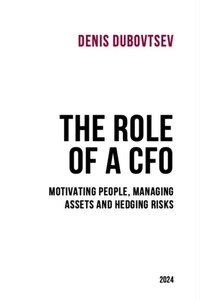Читать The Role of a CFO: motivating people, managing assets and hedging risks - Денис Дубовцев

На данной странице вы можете читать онлайн книгу "The Role of a CFO: motivating people, managing assets and hedging risks" автора Денис Дубовцев. Общий объем текста составляет эквивалент 165 бумажных страниц. Произведение многоплановое и затрагивает разнообразные темы, однако его жанры наиболее вероятно можно определить как корпоративные финансы, финансовый менеджмент, организационный менеджмент. Книга была добавлена в библиотеку 17.04.2025, и с этой даты любой желающий может удобно читать ее без регистрации. Наша читалка адаптирована под разные размеры экранов, поэтому текст будет одинаково хорошо смотреться и на маленьком дисплее телефона, и на огромном телевизоре.
How to build financial processes in a modern company to get a minimum of bureaucracy and a maximum of humanity? Should we encourage the entrepreneurial aspirations of employees? If so, how to organize this without violating control processes and fulfilling the company's obligations?
The book "The Role of a CFO" will give detailed answers to the most important questions related to financial management in the context of a digital, highly competitive, rapidly transforming global economy. The practices and tools described in the book are suitable for financial specialists and managers, entrepreneurs, CEOs, board members, as well as anyone who wants to competently manage finances in business and personal life.





